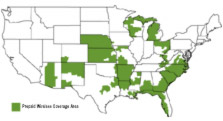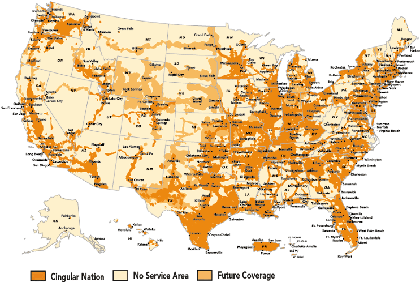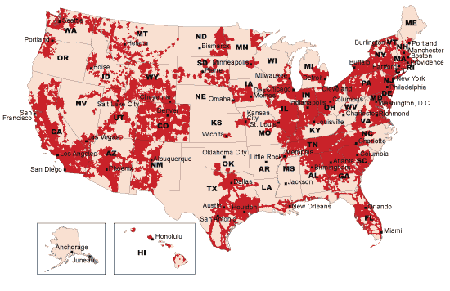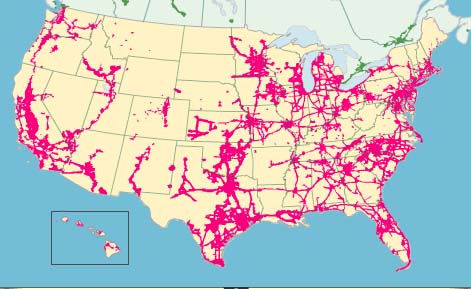Cellular Carrier Information
Goto: Home / Cellular
Home
The opinions expressed about the mobile phone compaies
and networks on this page consist of my own personal opinions formed
from my experience with each of the companies. I believe them to be
true; your experiences and opinions may differ from mine. The statistics
and rate plan information is accurate to the best of my knowledge as
of March 2003, but I do not guarantee the information's correctness
and am not liable for any errors or changes in this information.
General Notes:
Frequency: An individual carrier may
use the 800MHz band in some parts of the country and the 1900MHz band
in other parts. In this case, the carrier will be listed under the
band they use in Michigan. Carriers that use the 800MHz band are typically
more expensive and have better coverage than carriers that use the
1900MHz band, but this is not always the case.
Coverage: No
carrier in the United States has "true" nationwide coverage,
although many carriers offer plans that include roaming in either the
entire USA, or in certain parts of the USA, at no extra charge. With
other carriers, you may have to pay fees of up to $0.75/minute if you
use your phone outside of their coverage area. And with some carriers,
your phone will not work at all outside of the area covered by the
company.
Carriers:
Cellular (800MHz) Mobile Phone Carriers:
PCS (1900MHz) Mobile Phone Carriers:
|
|
Carrier Details
Centennial Wireless:
| Network Type: |
800MHz IS-54 ("TDMA") and AMPS |
| Coverage Area: |
Southwest Lower Michigan
Several Counties in Central Lower Michigan
Parts of Northern Indiana
Several Counties in Ohio
Louisiana (3 servace regions)
Three Counties in Texas
Parts of Southwest Mississippi
|
| Roaming: |
Yes, true nationwide. |
| Data Features: |
MO and MT SMS
SMS from Internet: Yes
SMS to Internet: No
No Packet Data
No Circuit Data (I think) |
| Operator URL: |
http://www.centennialwireless.com/ |
Comments:
Centennial Wireless has fairly low prices and they have excellent coverage
in the areas in which they operate, but these areas are small in size (less
than a full state each), and fairly low in number. Also, on their normal
plans, you often have to pay roaming fees if you use your phone outside
of your local area, even if you are still on Centennial's own network. They
make a confusing distinction between the "Primary Service Area" and "Home
Calling Area" that has something to do with roaming and long distance fees.
However, if you do not travel outside of your local area very often, they
may be a very good choice of carrier.
Recently, Centennial Wireless has announced
several new plans that reduce or eliminate per-minute roaming charges when
travelling throughout the United
States. Naturally, these plans cost more than the local-only plans.
Centennial Wireless has announced that they are planning to convert their
network to GSM800 sometime in the future. To my knowledge, their GSM network
has not yet gone live.
Alltel:
| Network Type: |
800MHz CDMA* and AMPS
*In Michigan, Wisconsin, and certain other states, Alltel is in the process
of converting from IS-54 ("TDMA") to CDMA. |
| Coverage Area: |
As of March 2003 (From Alltel's Website):

|
| Roaming: |
Yes, true nationwide. |
| Data Features: |
MO and MT SMS (unlimited incoming & 300 outgoing
w/monthly fee)
SMS from Internet: Yes
SMS to Internet: Yes
No Packet Data
Circuit-switched Wireless Web on Handset
Circuit-switched PC/Laptop tethered connection (presumably). |
| Operator URL: |
http://www.alltel.com/ |
Comments:
Being an 800MHz CDMA carrier, Alltel usually has very solid coverge in their
areas of operation. They have also partnered with other CDMA carriers such
as Sprint PCS, Verizon Wireless, and U.S. Cellular, to provide no-charge digital
roaming in most parts of the country on their relatively affordable "National
Freedom" plans. The National Freedom plans cover most parts of the country,
but if you need to use your phone outside of that area, you can pay more and
get a "Total Freedom" plan that has no roaming charges anywhere in the United
States.
I believe that Alltel is either in the process of, or at least considering
upgrading their network to CDMA2000 1xRTT. However, no packet-based data services
appear to be available at this time. I think that their current circuit-based
pay-per-minute data services are still using 14.4kbps CDMA, but it is perhaps
possible that 144kbps 1xRTT is used (and still billed per minute) on some of
their newer phones.
Cingular Wireless:
| Network Type: |
800MHz IS-54 ("TDMA") and AMPS.
In the process of overlaying 800MHz and 1900MHz GSM throughout their coverage
areas. |
| Coverage Area: |
GSM*:

In this GSM map, some of the "Cingular Nation" coverage is actually roaming
coverage. If you have a CIngular Nation plan, you will not have to pay
per-minute roaming fees in these areas, but if you have a local plan,
you may have to pay by the minute in some of the orange colored areas.
Check Cingular's website for details.
TDMA/AMPS:
Map available soon. Various areas.
|
| Roaming: |
Yes, GSM-only or true-nationwide, depending upon handset. |
| Data Features: |
MO and MT SMS
SMS from Internet: Yes
SMS to Internet: Unknown
GPRS Packet-switched Wireless Web on GSM Handsets.
Circuit-switched Wireless Web on some TDMA handsets.
Circuit/Packet-switched tethered PC/Laptop connection
unknown.
|
| Operator URL: |
http://www.cingular.com/ |
Comments:
Cingular Wireless is in the process of converting their network from TDMA
to GSM. Their 800MHz TDMA/AMPS areas typically have very solid coverage. However,
in some areas in which they provide 800MHz TDMA service, instead of converting
these systems to GSM800, they have built out GSM1900 overlays (such as the
Detroit market). This often results in poor GSM coverage in those regions.
I would imagine that they will eventually add GSM800 in these areas, but I
do not know that for certain.
If you have a TDMA/AMPS phone and a Cingular plan, you can roam anywhere in
the U.S. that cellular service is available, either for a fee or included in
your minutes depending upon your plan. If you have a Cingular GSM phone and
plan, you can only roam on other GSM carriers, and only in some areas Cingular
is currently negotiating GSM roaming agreements for more areas.
Verizon Wireless:
| Network Type: |
1900MHz CDMA, 800MHz CDMA, and AMPS |
| Coverage Area: |
Southeast Lower Michigan and red areas in map:

|
| Roaming: |
Yes, true nationwide. |
| Data Features: |
MO and MT SMS.
SMS from Internet: Yes
SMS to Internet: Unknown
Circuit-switched Wireless Web on handsets.
Packet-switched 1xRTT (144kbps) data for laptop/PC connections. |
| Operator URL: |
http://www.verizonwireless.com/ |
Comments:
Verizon uses the 800MHz band in most areas in which they operate, but a few
areas are 1900MHz. Verizon Wireless typically has very solid coverage in their
800MHz zones. I have never tried their service in a 1900MHz area. Verizon Wireless
has also partnered with other CDMA carriers such as Sprint PCS, Alltel, and
U.S. Cellular, to provide no-charge digital roaming in most parts of the country
on their relatively affordable "America's Choice" plans. The America's
Choice plans cover most parts of the country, but if you need to use your phone
outside of that area, you can pay more and
get a "National Singlerate" plan that has no roaming charges anywhere
in the United States.
Recently, Verizon Wireless has started to sell a few CDMA-only phones that
do not include AMPS support. If you have one of these phones, you will only
be able to use it where CDMA service is available. There are relatively few
areas in which this would be a problem, but you should ask about this before
buying a Verizon phone.
Nextel:
| Network Type: |
iDEN (800MHz SMR Band) |
| Coverage Area: |
More or less nationwide. Coverage varies by region,
check map on carrier website.
|
| Roaming: |
Yes, iDEN-only in USA, and GSM overseas. "True-nationwide"
roaming not available in USA. |
| Data Features: |
MT SMS
SMS from Internet: Yes
SMS to Internet: Yes (browser based)
Can send browser-based SMS and E-Mail from handset.
Packet-switched Wireless Web on handset.
Circuit-switched data (9600bps) for tethered laptop/PC connection.
Packet-switched data (up to ~44000bps) for tethered laptop/PC connection. |
| Operator URL: |
http://www.nextel.com/ |
Comments:
Nextel, via the use of the SMR Band, has very good coverage in the areas in
which they operate. However, (akin to the situation with GSM) you cannot roam
onto any non-iDEN networks in the United States with a Nextel phone, not even
in order to call 911. Luckily, Nextel's coverage is quite extensive, but you
should check their map before purchasing, because you will be absolutely out
of luck if you leave their coverage area and need to place a call.
Nextel, of course, is known for their walkie-talkie like "two-way" service.
They also have a wide variety of data plans including unlimited handset-based
Internet (via packet data) for $10/month. Nextel also has the most affordable
tethered (PC or Laptop use) data plans available at this time except for those
offered by T-Mobile. Nextel's iDEN network is typically somewhat faster than
GSM/GPRS for data transfers, but not as fast as the CDMA2000 1xRTT networks
of Verizon and Sprint PCS.
T-Mobile:
| Network Type: |
1900MHz GSM |
| Coverage Area: |
As of March 2003 (From T-Mobile's Website):
|
| Roaming: |
None in USA. Can roam onto GSM networks in Canada and
overseas. |
| Data Features: |
MO and MT SMS.
SMS from Internet: Yes
SMS to Internet: Yes (I think)
Packet-switched (GPRS) Wireless Web on handset.
Packet-switched (GPRS) laptop/PC tethered data. |
| Operator URL: |
http://www.t-mobile.com/ |
Comments:
T-Mobile is (by my understanding) the oldest and arguably largest GSM carrier
in the United States. They use only GSM1900. Their coverage is very lacking
in some areas, but very good in others, so you might want to take advantage
of their trial period if you are thinking about buying a T-Mobile phone and
service. At this time, T-Mobile does not allow roaming on any other networks
in the United States, so if you leave the T-Mobile coverage area and need to
place a call, you will be out of luck. If there is another GSM carrier available,
you will be able to place 911 calls, but if T-Mobile doesn't have GSM coverage
in an area, then chances are that there is no GSM coverage there at all.
At this time, T-Mobile offers the most inexpensive Internet access plans of
any carrier in the U.S., with unlimited on-handset access for $9.99/mo and
unlimited tethered (Laptop/PC) access for $19.99/mo. The Internet access is
provided using T-Mobile's GPRS network which has similar coverage to their
GSM network. GPRS is usually a bit slower than iDEN, and considerably slower
than CDMA2000 1xRTT.
Sprint PCS:
| Network Type: |
1900MHz CDMA (1xRTT) |
| Coverage Area: |
More-or-less nationwide. Coverage varies by region,
check maps on carrier website.
|
| Roaming: |
Yes, true nationwide. |
| Data Features: |
MT SMS.
SMS from Internet: Yes
SMS to Internet: Yes (browser-based)
Can send browser-based SMS and E-Mail from handset.
Circuit-switched Wireless Web on 2G handsets.
Circuit-switched laptop/PC tethered data available on 2G/3G handsets.
Packet-switched Wireless Web on new 3G handsets.
Packet-switched tethered laptop/PC connection on 3G handsets & PCMCIA
cards. |
| Operator URL: |
http://www.sprintpcs.com/ |
Comments:
Sprint PCS is a 1900MHz CDMA carrier which has really come a long way in the
past couple of years. Their coverage used to be pretty marginal in some areas,
but it seems to have improved a great deal. Their regular service plans work
anywhere on the Sprint PCS network which has coverage in most major metropolitan
areas and connecting highways, and is now beginning to cover a sizeable portion
of less densely populated areas. There is a lot of debate over whether Sprint
PCS or T-Mobile has better coverage. It is my opinion that Sprint PCS has noticeably
better coverage than T-Mobile in general terms, but this is not true in all
areas.
Sprint PCS has recently introduced a $5/month add-on that allows you to place
and receive calls for no per-minute charge virtually anywhere in the country
that there is an AMPS or CDMA system.
Sprint PCS has unlimited 144kbps 1xRTT on-handset data plans available as
a $15/month plan add-on. These plans currently work for tethered (PC or Laptop)
usage as well, but you are not supposed to use them for this, and doing so
may be against the terms of service. More expensive PC/Laptop data plans are
available for PCMCIA Data Card devices.
AT&T Wireless:
| Network Type: |
800MHz and 1900MHz IS-54/136 ("TDMA")
and AMPS
In the process of overlaying 800MHz and 1900MHz GSM throughout their coverage
areas. |
| Coverage Area: |
In Michigan: Southeast lower Michigan, Saginaw, Grand
Rapids, etc...
Various coverage in other parts of USA. |
| Roaming: |
Yes. GSM-only on GSM handsets, true-nationwide on TDMA/GAIT
handsets. |
| Data Features: |
MO and MT SMS
SMS from Internet: Yes
SMS to Internet: Yes
Packet-switched Wireless Web on GSM/GPRS handsets.
Packet-switched laptop/PC tethered data on GSM/GPRS handsets. |
| Operator URL: |
http://www.attws.com |
Comments:
AT&T Wireless is in the process of converting their TDMA networks to GSM.
At the present time, the coverage maps on AT&T's website are rather ambiguous
due to the GSM conversion. In general, though, AT&T mostly has coverage in
major metropolitan areas, but they have more extensive coverage in their (relatively
few) 800MHz license regions.
AT&T offers a variety of local-only and free-roaming plans on both their TDMA/AMPS
and GSM networks. However, as with all GSM networks, if you are in an area
with no GSM coverage, you will not be able to place or receive any calls (not
even 911 calls), unless you happen to have one of the rare combination-GSM/TDMA
phones that AT&T sells.
AT&T offers GPRS data plans for on-handset and tethered usage, but you must
pay per kilobyte and the data plans are very expensive.
Airlink PCS:
| Network Type: |
1900MHz GSM |
| Coverage Area: |
Licensed for six counties in Southwest Lower Michigan
Actual coverage in some parts of Kalamazoo and Battle Creek and surrounding
areas. |
| Roaming: |
None. |
| Data Features: |
MT and MO SMS
SMS from Internet: Yes
SMS to Internet: No
No circuit-switched or packet-switched Wireless Web or tethered data. |
| Operator URL: |
http://www.airlinkpcs.com/ |
Comments:
Airlink PCS is a small cell phone company based in Kalamazoo, Michigan. They
are only licensed for the 6-county region surrounding Kalamazoo County, and
they only cover a small portion of that. Their actual coverage even within
the 6-county region is quite limited. Do not assume that you will have good
Airlink coverage just because you are in the City of Kalamazoo.
On the plus side, Airlink does offer prepaid service plans that are much less
expensive than those offered by the national providers. You can get prepaid
minutes at $0.14/min or lower from Airlink. Minutes last for 60 days and include
Voicemail, Caller ID, Call Waiting, Call Forwarding, and unlimited SMS. Be
careful with Airlink's "unlimited" plans. At the current time, they include
unlimited outgoing minutes, but pay for incoming calls after a certain number
of minutes.
You cannot use an Airlink PCS phone on any system except for Airlink's own,
so if you leave their coverage area, you will not be able to place or receive
a call.
Cricket Communications:
| Network Type: |
1900MHz CDMA |
| Coverage Area: |
Approximately 25 metropolitan areas in the USA. |
| Roaming: |
No. |
| Data Features: |
MT and MO SMS
SMS from Internet: Yes
SMS to Internet: No
No circuit-switched or packet-switched Wireless Web or tethered data. |
| Operator URL: |
http://www.cricketcommunications.com/ |
Comments:
Cricket is a lot like Airlink PCS, only better. They offer service in 25 different
metropolitan areas in the United States. I believe that Cricket phones only
work in the metro area where they are activated. However, Cricket uses a CDMA
network and seems to have significantly better coverage than Airlink PCS in
the Kalamazoo area.
Cricket's primary service plan is $32.99/mo for unlimited incoming and outgoing
calls. For this reason, some people replace their landline home phones with
Cricket phones. Long distance (not applicable to local and toll-free calls)
is $0.08/minute.
Cricket does not require a contract period, which makes them perfect
for students or for temporary use.
However,
there
are extra
charges
for
services
like
Caller
ID
and Voicemail.
You can only use your Cricket phone in covered parts of your metro area, so
if you travel outside of your city very often, Cricket is probably not the
choice for you. However, Cricket phones will place 911 calls using some other
carriers'
CDMA networks (such as Sprint PCS), so 911 service may be available in some
areas where regular Cricket service is not.

